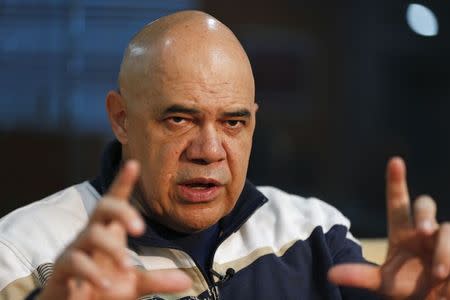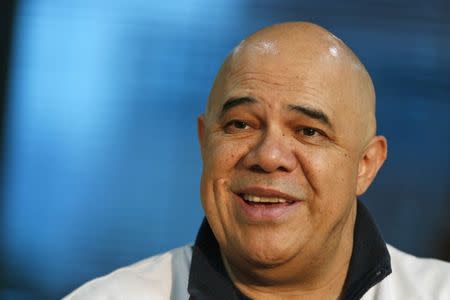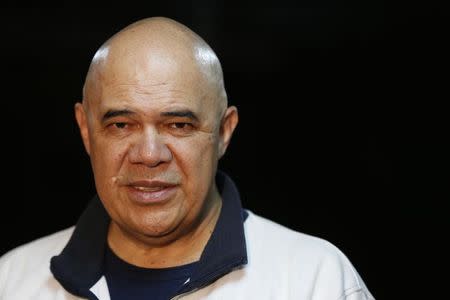Venezuelan opposition head seeks 2015 vote gains, and 'Caribbean Norway'
By Andrew Cawthorne and Corina Pons CARACAS (Reuters) - Venezuela's new opposition chief is targeting 2015 parliamentary elections as a springboard to end more than 15 years of socialist rule. Given its huge oil reserves and relatively small population of 29 million, Venezuela should not have to tolerate its "catastrophic" economic performance, Jesus Torrealba, the newly named leader of the opposition coalition, said in an interview. "Forgive me if it sounds pretentious, but I want to live with the quality of life they have in Norway - with a Venezuelan flavor," he said, citing the Nordic country's oil-funded development and commitment to social welfare. "A Caribbean Norway - it's perfectly possible." After being outwitted for years by late socialist leader Hugo Chavez and then narrowly losing last year's presidential vote to his hand-picked successor Nicolas Maduro, opposition parties' next chance at the polls is a National Assembly election in late 2015. In their favor, Maduro's approval rating has fallen to about 35 percent and a deepening economic crisis, ranging from chronic shortages of basic products to the highest inflation in the Americas, is causing widespread discontent. Stacked against that are the equally bad ratings for opposition leaders and divisions inside the Democratic Unity (MUD) coalition over anti-Maduro protests earlier this year that sparked violence killing 43 people but did not dislodge him. Into that fray has come Torrealba, a 56-year-old journalist, activist and teacher. A surprise choice as executive-secretary of the MUD, he is charged with uniting opposition factions and preparing them for the 2015 vote. A Communist Party member in his youth, he is urging mass mobilizations in poor areas where Chavez is revered, but residents now feel the sharp end of the economic crisis. That work, he said, will bring electoral gains. "We are going to win a majority, a wide majority, in the National Assembly, to re-establish democratic balance in Venezuela," said Torrealba. "But elections are times of reaping and you can't reap what you haven't sown. Each vote counted in 2015 has to be a vote that we sweat for today." UNITING FACTIONS In Venezuela's last assembly elections in 2010, the popular vote was broadly split down the middle though the ruling Socialist Party, and its allies won nearly two-thirds of seats, thanks to a favorable representation system. Opposition gains next year would enable them to put pressure on Maduro from parliament and potentially launch a push for a recall referendum half-way through his term in 2016. That would require nearly 4 million signatures from Venezuelans, an option the opposition is keeping up its sleeve. "We'll cross that bridge when we reach the river," Torrealba said. Popular among opposition supporters, he has a reputation for being a friendly figure and smooth communicator in touch with Venezuela's slums. He has for years run the "Neighborhoods' Radar" organization, promoting community activism, and used to have a TV show of the same name on formerly pro-opposition network Globovision, denouncing problems from potholes to power cuts. Torrealba, who comes from a poor family in contrast to the elitist credentials of many Venezuelan opposition figures, has a mammoth task aligning pragmatic and radical opposition factions led respectively by twice-presidential candidate Henrique Capriles and jailed protest leader Leopoldo Lopez. Those factions squabbled over whether street protests were the right way to oppose Maduro, openly criticizing each other earlier in the year to the delight of government leaders. Tensions are subsiding, Torrealba said, citing his own unanimously supported appointment as an example. "The parties are understanding the need to row in the same direction. ... They (Capriles and Lopez) are adults. They're both important leaders and I'm sure both will be president of this country one day. I'm not a circus lion-tamer!" The new MUD head has quickly clashed with Maduro. The president described him as "trash" for offering condolences over the recent murder of a young Socialist Party legislator. Other government officials mocked his appointment as a desperate ploy to build bridges with the poor. In the interview, his first with foreign media, Torrealba hit back, saying Maduro's record was a disaster on all fronts, from unchecked violent crime to an unprecedented shortage of medicines. He called Maduro the "main obstacle" to dialogue. "The glacier that was 'Chavismo' is starting to melt," Torrealba said, dressed in jeans and unaccompanied by bodyguards or aides during a two-hour conversation at the weekend. "The Maduro government is in free fall," he said, adding that only Haiti's economy was doing worse in the Americas. "Our objective is urgent political change. ... What we have in Venezuela doesn't have a drop of communism; it's an authoritarian process with massive looting of public wealth." (Editing by Alexandra Ulmer and Kieran Murray; Editing by Richard Chang)




